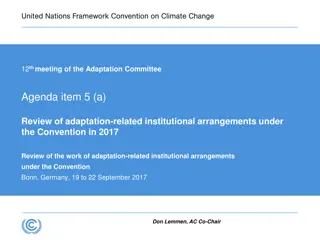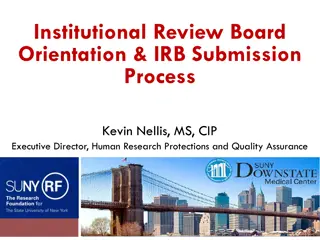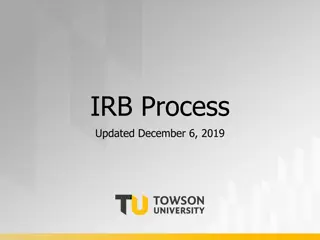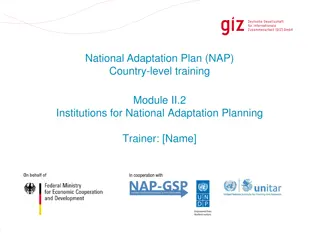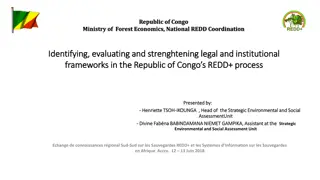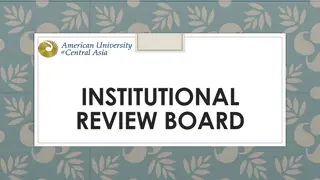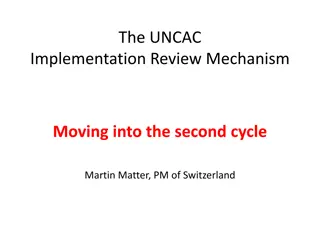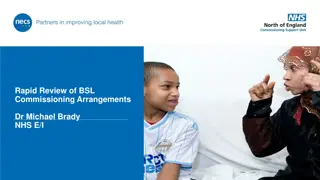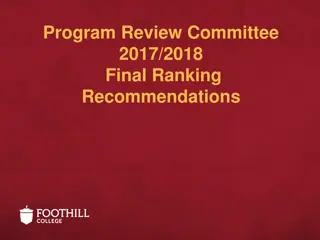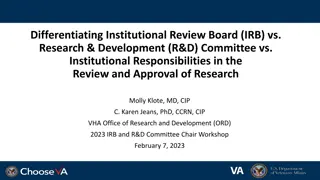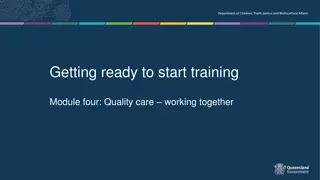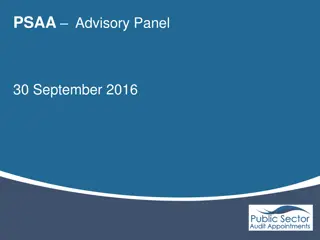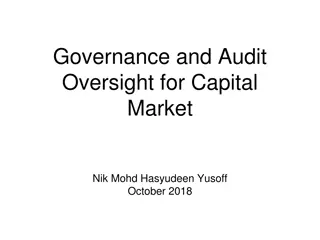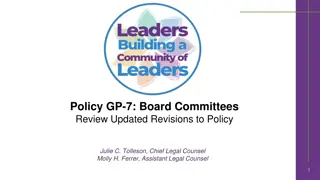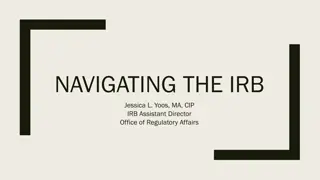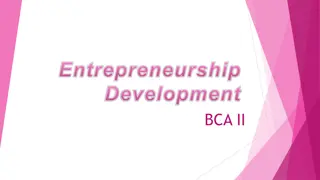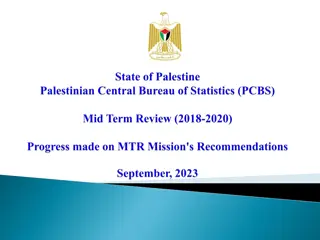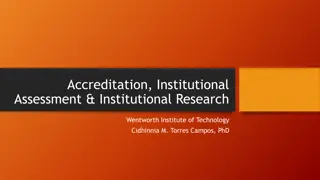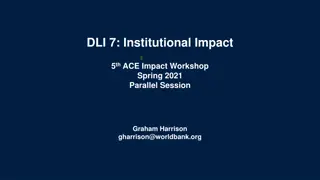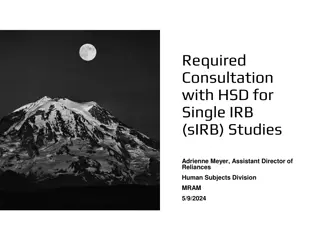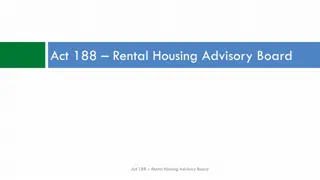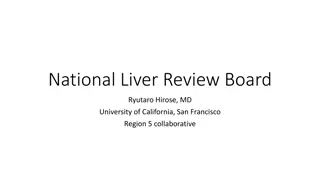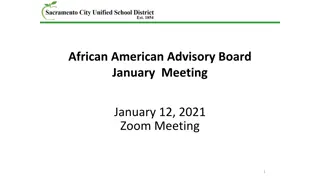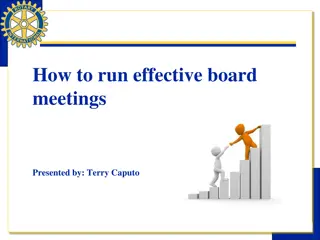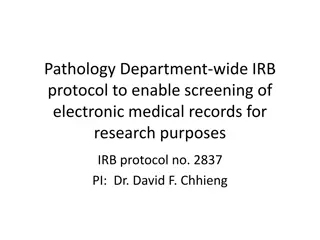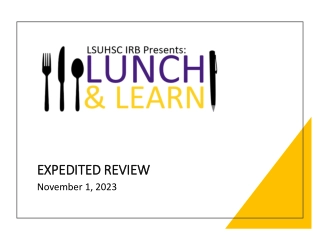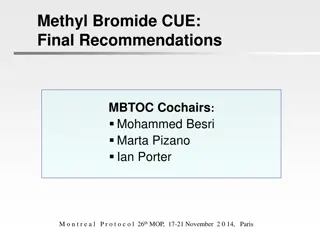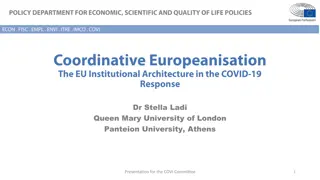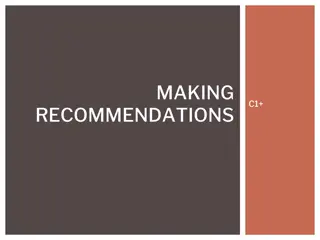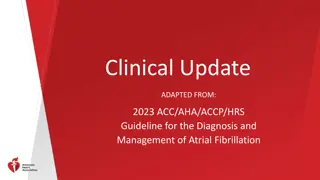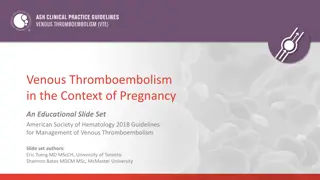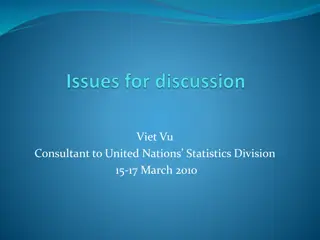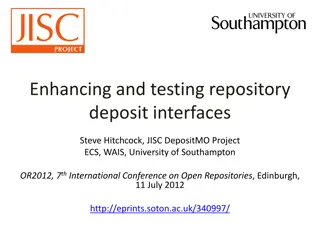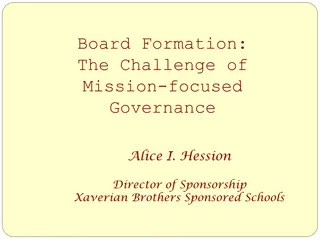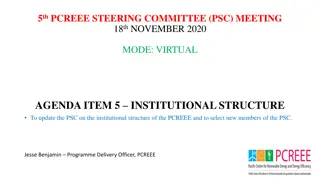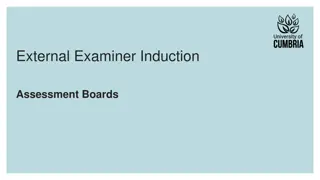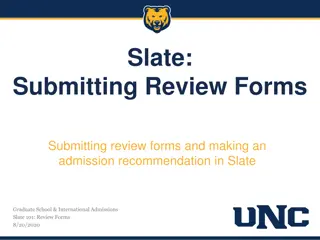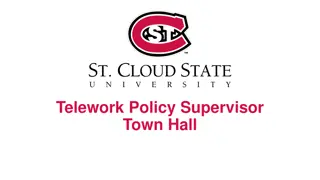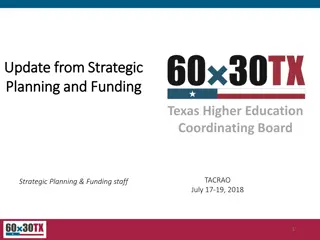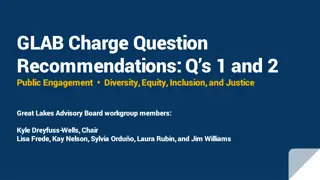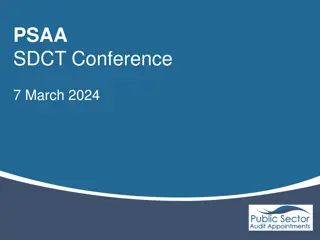Review of IATI's Institutional Arrangements and Board Recommendations
Review of IATI's Institutional Arrangements and Board Recommendations presented at the IATI Members Assembly in Rome, covering categories of recommendations, decisions made by the Board, and recommendations pending MA approval regarding governance issues.
Uploaded on Sep 17, 2024 | 0 Views
Download Presentation

Please find below an Image/Link to download the presentation.
The content on the website is provided AS IS for your information and personal use only. It may not be sold, licensed, or shared on other websites without obtaining consent from the author. Download presentation by click this link. If you encounter any issues during the download, it is possible that the publisher has removed the file from their server.
E N D
Presentation Transcript
Review of IATIs Institutional Arrangements Governing Board Recommendations to IATI MA IATI Members Assembly Oct 3-5, 2017, Rome
Two Main Groups of Recommendations The 14 recommendations from the consultants report were divided in two categories: Category A - Stand-Alone Category B Related to Hosting #1: Provision of technical services #2: IATI value proposition statement #3: Board Code of Conduct #5: Partner country fee options #6: Partner country fee waiver #8: Partner country travel budget #12: Chair selection #4: New membership category #7: Fee structure #9: Board size and composition #10: Board voting method #11: Executive Director #13: Secretariat model #14: Secretariat location
Session 7 Category A Board made decisions on four recommendations: #1: Feasibility assessment of prioritizing members when providing technical support Accepted Secretariat to perform the assessment and report back to Board #2: IATI value proposition statement Accepted Statement under development #8: Ceiling on partner country travel budget Rejected No further action #12: Chair selection process maintained Accepted No further action
Category A (continued) Board seeks MA decisions on the following recommendations: #3: Clarification to Board Code of Conduct regarding conflicts of interest MA decision: Board recommends approval of following language: A member of the board believing they may have an actual, potential or apparent conflict of interest concerning a proposal to be discussed by the board shall recuse themselves from that Board discussion and inform the Chair accordingly. They must abstain from communicating with other Board Members regarding the subject. The Governing Board must make a strong collective commitment to upholding recusal practices. #5: Partner country contribution as fee or travel MA decision: Board recommends approval (SOP to be amended) #6: Board waiver for partner country fee MA decision: Board recommends approval (SOP to be amended)
Session 8 Introduction Session covers issues related to hosting, including: Secretariat model (recommendation #13) Executive Director (recommendation #11) Secretariat location (recommendation #14) Membership categories (recommendation #4) Board size and voting (recommendations #9 and 10) Membership fee structure (recommendation #7) MA discussion is needed on these inter-related issues to provide strategic guidance for additional work on future arrangements
Secretariat Structure & Hosting (Recommendations 13, 11 and 14) Several options possible (four in consultants report, further variations possible) Key variables of options include independence, lines of accountability, legal status. In all options, assumption that Secretariat maintains same fuctions as current one, including: Overall management of IATI, including financial management Technical development and support Communications and outreach Support to Members Assembly and Board, including for strategic planning Cost was mentioned by most members, especially with regards to creating an ED position
Hosting Models Factors to Consider Board outlined several factors in paper: Costs Predictability and stability of funding Financial management Legal status Role of IATI as political and technical initiative Agility and innovation All should be considered in assessing hosting options
Model 1 or 2: Hosted Secretariat Secretariat hosted by another organization (either large eg multilateral, or smaller/in different field) Host policies and rules would apply for e.g. staffing, procurement. In some cases, host may expect alignment with own mandate or weigh in on strategic direction (e.g. by having seat on Board) Potential pros: Easier transition from current arrangements Less risk of liability for Board Potential cons: ED would be host staff, weaker accountability to Board/members Members have no say on location Host rules may constrain agility and innovation Costs: would likely depend on host organizations (e.g. salary scales, overhead) Examples: Paris-21, Global Partnership for Social Accountability (option 1); Global Initiative for Fiscal Transparency (option 2)
Model 3 or 4: Independent Secretariat Standalone, independent Secretariat, headed by Executive Director fully accountable to Board , either with all functions or management support from service platform Potential pros: Secretariat policies and rules defined by members based on their priorities and needs, without interference from a hosting organization More agile (eg staffing, procurement) and innovative Platform (option 4) can provide financial and management services that meet donor requirements (but won t intervene on policy issues). Potential cons: Longer, more difficult transition from current model Option 3 requires a legal entity, which may take time Potential legal liabilities for Board to be addressed Lack of track records (option 3) could complicate donor funding Costs: would depend on location (office space, competitive salaries), costs of support platform (option 4) Examples: EITI (option 3); Open Government Partnership and Open Contracting Partnership (option 4)
Hosting, Executive Director, Location: Way Forward General member support for an independent secretariat with Executive Director (ie options 3-4) However, many asked for more detailed assessments before a firm decision is made, including of costs. Concerns were also raised about IATI s standing if formal link to UNDP was not maintained. Decisions about the Executive Director position and location depend on hosting model chosen. Board is unable to recommend a specific option to members at this point. MA Decision: Board requests members approval to create a working group to study the issues and develop recommendations on hosting, ED position and location for members approval.
Fee Structure (Recommendation 7) The current fee structure was approved in 2016 for two years, until August 2018. Board sees value in consultants recommendation to make fee structure more progressive. However, the need for stable, predictable funding for the new secretariat should take precedence. MA Decision: Board recommends that the current fee structure be extended for 1 year (to August 2019) MA Decision: Board further recommends to replace the term membership fee with membership contribution , to better reflect the nature of members financial support to IATI (in line with proposed value statement).
Membership Categories (Recommendation 4) Private sector members are currently part of the CSO and others category of IATI members. Many private sector actors are involved in the TAG but not members of IATI. Consultants suggest that greater private sector involvement could bring a different perspective and make a valuable contribution to IATI. They also flag governance problems related to having CSO and private sector members in the same constituency (thus having to develop common positions). Consultations held by Board show that members had divergent views on proposalto create separate category for private sector: Maintaining tri-partite nature of IATI vs Aligning with other multistakeholder initiative where role of private sector in SDGs is recognized Similarly, the Board could not reach consensus on a recommendation to members MA Decision: Should a new category be created for private sector members?
Board Structure & Working Methods (Recommendations 9 and 10) A larger and more diverse Board may be beneficial to provide adequate oversight and direction to the IATI Secretariat This may be especially true for an independent secretariat A larger Board may require more formal decision-making processes The Board agrees in principle, but believes that decisions on these points should be defered until other decisions (especially on the hosting model) are made MA Decision: No decision recommended by members at this point (though possible). The Board will consider potential further action based on the working group recommendations on hosting.
Way Forward The transition process to new institutional arrangements would vary depending on secretariat model chosen. For instance: Options 1 and 2 involve negoting terms with the host organization for e.g. cost-sharing, independence of the secretariat accountability of its management staff, integration of technical functions in the host organization, etc. Option 3 involves choosing a location, creating a legal entity, hiring an Executive Director and creating the organizational structure. Option 4 involves a request for proposal to choose a support platform, in addition to hiring an Executive Director, but less work in creating the organizational structure.
Way Forward (continued) In all cases, key early milestones include: Creation of the working group Oct 2017 Detailed costing assessment of options Nov 2017 Assessment of potential locations Dec 2017 Recommendations to members Dec 2017 Members decision on hosting and location Jan 2018 Appointment of a transition lead Jan 2018 Terms of reference for new secretariat Feb 2018 Board seeks volunteers and in-kind support for the working group
Recap - List of MA Decisions Required Members are asked to decide on: New language for Board Code of Conduct (#3) New rules for partner country contributions (#5 and 6) Extension of fee structure (#7) and change to terminology New membership category (#4) New working group on hosting (and inclusion of related questions on location, ED, Board size in its mandate) Members are also asked to signal interest in joining working group and/or in supporting its work
Annex Consultants Recommendations
#1: the IATI technical team should assess the feasibility of prioritizing technical support for members over non-members, subject to a consideration of all other factors, as a way of providing a modest incentive for non-members to join the initiative. #2: The Members Assembly should approve a clear value proposition statement for the website. This statement should be amended if the incentives are changed. #3: IATI should amend the current Code of Conduct for Members of the IATI Governing Board in the Conflict of Interest section to specifically require that Board Members recuse themselves from any board discussion in which an actual, potential or apparent conflict of interest arises. The IATI Governing Board should make a strong collective commitment to upholding the recusal practices. #4: A separate category of private sector membership should be spun out from the CSO and other category in the short to medium-term. Relevant private sector actors should be encouraged to join the initiative as members and to serve on the board. A decision by IATI to follow this recommendation would generate governance consequences, namely a need to represent the private sector on the Governing Board. 5: Each partner country should be provided with the option to either pay for its own travel or pay the annual fee. Payment of EITHER an annual fee or travel to one meeting in a year would deem that country in good standing.
6: A partner country experiencing financial difficulties may write to the Chair of IATI and request that the board waive its annual fee for that year, providing an explanation of the financial difficulties it is encountering. The board should in all cases waive the fee if it is reasonable to do so under the circumstances. 7: The IATI Governing Board and Members Assembly should review the fee structure with a view of making it more progressive; raising or reducing the lowest fees to reduce barriers to entry and/or transaction costs, but also respecting the principle of ability to pay. The consultation phase of the review should be long enough to ensure that all constituencies have ample opportunity to voice their views about the fee structure. 8: To ensure predictability in the annual budget, partner country travel should be a separate budget line that is funded at a set amount per annum. Partner countries as a group should manage this budget and determine the best way to allocate it to maximize partner country travel. 9: IATI s SOPs should be amended to include the principle that for Governing Board decisions taken by vote, a certain level of support by each of the three key constituencies (partner countries, assistance providers, and civil society) is required. This could be effectuated by requiring at least one vote from each constituency. 10: In the short to medium-term, the Governing Board should be enlarged from seven members to ten members, composed of three providers, three partner countries, two civil society organizations, and one private sector member, plus the Chair of the TAG. The quorum should be set at five or six participants, in accordance with what is determined to be the most workable and appropriate by the Members Assembly.
11: The position of Executive Director should be created. The positions precise responsibilities and lines of accountability should be determined in accordance with the institutional arrangements decided by the Members Assembly, but generally, they should set out toward a strong level of accountability to the Governing Board. A competitive salary and generous benefits should be offered to help attract the most qualified candidates. 12: The current model of chair selection via election of a board member should be retained in the short-term. We recommend that the Members Assembly revisit the question of an external chair in the medium to long-term, for example, in five years time, particularly if it decides to implement a completely independent, standalone secretariat. At that point, a determination could be made as to whether the potential benefits of an external chair would likely outweigh any risks. 13: All things considered, we recommend Option 3 or 4, which we believe represent the options most likely to help IATI succeed in meeting its medium and long-term goals. IATI has an important mission, a challenging agenda, but a very strong and committed community. A streamlined secretariat with capable and entrepreneurial staff, a governance system which consolidates authority, clarifies accountability, and facilitates action, and a dependable revenue flow for years to come will help IATI move from vision to action with greater speed and clarity. 14: We do not recommend that IATI solicit expressions of interest from governments. We recommend instead that IATI select a city which most likely favours a successful secretariat, taking into account all factors.


